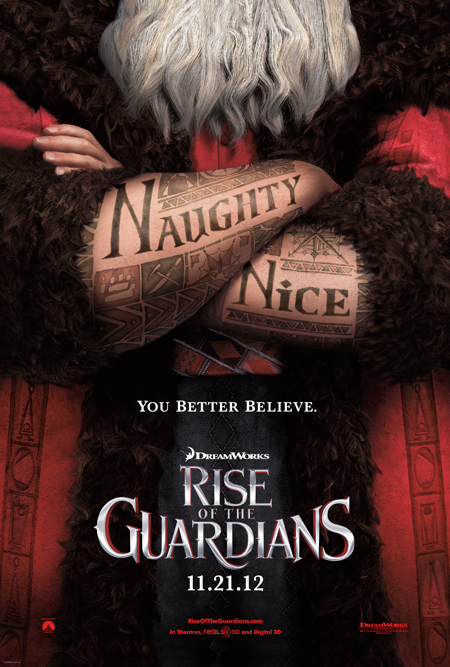
Future Fragments: Rise of the Guardians + Modern Childhood
Written by: Anastasia Salter, Pop-Culture Editor
 Rise of the Guardians is surprisingly one of the most enjoyable movies I’ve seen this season, with its intricate melding of whimsical and historical design with a futuristic, almost steampunk take on classic childhood figures. But there’s more than meets the eye to this film’s use of every holiday figure from Santa Claus to the Easter Bunny and Tooth Fairy as fuel for a nostalgic reflection on the importance of childhood and the many influences (particularly at our current moment in time) that cause us to grow up faster than intended.
Rise of the Guardians is surprisingly one of the most enjoyable movies I’ve seen this season, with its intricate melding of whimsical and historical design with a futuristic, almost steampunk take on classic childhood figures. But there’s more than meets the eye to this film’s use of every holiday figure from Santa Claus to the Easter Bunny and Tooth Fairy as fuel for a nostalgic reflection on the importance of childhood and the many influences (particularly at our current moment in time) that cause us to grow up faster than intended.
Adapted from the Guardians of Childhood chapter book series by William Joyce, Rise of the Guardians features a tattooed Santa Claus, flossing-obsessed Tooth Fairy, Australian Easter Bunny, silent Sandman and unlikely new hero Jack Frost fighting to protect the innocence and idealism of children plagued by nightmares. Graphically, the film is inspired, with adorable yetis making Santa’s toys (but letting the elves think they’re accomplishing something) while “Easter Island” worthy marching egg statues back up the Easter Bunny’s operations. For any kid who has ever devoted real time to trying to figure out the logistics of these holiday headquarters, these depictions alone are enough appeal for the film, even if there’s a certain Despicable Me minion quality to the fumbling elves.
Rise of the Guardians is a film of holidays interrupted, and the guardians are out to preserve the belief that keeps their headquarters in operation. It’s not hard to draw a parallel to discussions of the fate of so-called digital natives, the apparently prematurely worldly generation raised on ‘net-ready devices from birth. Early on, the film uses a globe displaying the lights of children believers in Santa Claus et al that lights up like a map of the world’s information networks, an appropriate metaphor given that the children are connected by their shared dreams—the same dreams the movie’s villain, voiced by Jude Law, plans to control with fear and nightmares.
The guardians’ struggles to protect childhood recall Terry Pratchett’s Hogfather , which follows similar lines with a struggle to keep the stories of Santa Claus and the Tooth Fairy alive to preserve Discworld. The timing for this type of tale seems particularly appropriate.
Consider the classic Miracle on 34th Street narrative, which ultimately offers a portrait of a young skeptic who comes to embrace fantasy as personified by Kris Kringle. Why is that story enduring, even as the spectacle of a court of “grown-ups” declaring a man to be the real Santa Claus seems perfectly absurd? Perhaps because it enforces the idea that in making it from one holiday to the next the naivety and optimism that come from innocent belief can be invaluable.
Stories certainly have power based on our belief, as a quick glance at any religion reminds us, for better or for worse. Yet Rise of the Guardians sticks to the most non-religious elements of holidays, sticking with universal themes and avoiding any question of when belief stops being a good thing. In that sense, it detours from the riskier ground that The Secret of Arietty trod with its exploration of the horrible things one might do to prove a belief in “little people” is justified. Instead, Rise of the Guardiances is concerned with the fragility of faith in the face of disappointment–a contrast from the more self-affirming message of Seuss’s Grinch confronted with the unshakable cheer of the Whos. It is a marker of our current fears that it is the ease of shattering childhood innocence with knowledge that grounds this film’s conflict.
I don’t remember believing in Santa Claus exactly, but I do remember a warning from my parents at a young age that I shouldn’t tell any of the other kids that Santa Claus—or any other bearded figures—weren’t real. Rise of the Guardians takes this warning many steps further, but mostly reminds us that innocence and playfulness are easy things to lose, particularly in the face of too much stress and sleepless nights.
We’re surrounded by fairy tale and children’s story adaptations right now, from the high profile Peter Jackson Hobbit trilogy to ABC’s Once Upon a Time. It is perhaps the perfect counterpoint to the other high-profile media phenomenon, apocalypse. Rise of the Guardians gently fuses those two genres, suggesting that a belief in fantastical figures, or at least the ideals they represent, might be the key to saving the world–or at least saving playfulness and wonder, which may well be the same thing.
